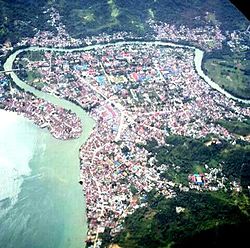Poso | |
|---|---|
 Poso in 2015 | |
 Sentinel-2 L2A satellite image, featuring the city of Poso in December 2020 | |
| Coordinates: 1°24′S120°45′E / 1.400°S 120.750°E | |
| Country | |
| Province | Central Sulawesi |
| Regency | Poso |
| Area | |
• Total | 66.8 km2 (25.8 sq mi) |
| Population (mid 2024 estimate) | |
• Total | 47,592 |
| [1] | |
| Time zone | UTC+8 (Central Indonesia Time) |
| Website | http://posokab.go.id/ |
Poso (Old Spelling: Posso) is the administrative capital of Poso Regency, Indonesia. It is the main port and transportation hub for the central-southern coast of Central Sulawesi. Its urban area consists of three districts, Poso Kota, North Poso Kota, and South Poso Kota. Poso lies in the middle of the province on the shore of the Gulf of Tomini, right in the central part of Sulawesi Island. With a total population of 47,592 in mid 2024, [1] it is one of the biggest and oldest towns in the province. [2]
Contents
Poso began to develop as a small port town located at the mouth of the Poso River at the end of the 19th century—making it one of the oldest towns in Central Sulawesi, its presence was considered important for the Dutch to control the southern region of Tomini in the early days of their arrival. Poso was the administrative center of Landschap Poso, Onderafdeling Poso, and later Afdeling Poso during colonial times. Amid World War II, the Japanese made Poso one of their military posts. Post-independence, Poso was chosen as the capital of the newly formed Central Sulawesi in 1948 before the capital was moved to Palu in 1951.
Poso's central location has historically made it a strategic stopover point for travelers moving between the north and south, as well as the west and east of Sulawesi. This has contributed to a diverse population, comprising various ethnicities, religions, and cultural backgrounds. The inhabitants are dispersed from coastal areas to the mountainous regions, with trade and services serving as the primary economic activities.
Poso is crossed by the Trans-Sulawesi National Highway and served by Kasiguncu Airport, linking it to other cities in Sulawesi such as Palu and Makassar.
